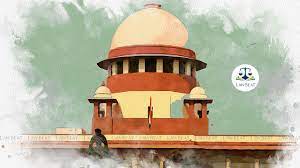Arbitral tribunal can impose costs for process abuse and harassment: SC

The arbitral tribunal may direct that the costs of the arbitration shall be borne by the party which the tribunal ultimately finds to have abused the process of law and caused unnecessary harassment to the other party to the arbitration, court said
The Supreme Court recently observed that the limited jurisdiction of the referral courts under Section 11 of the Arbitration and Conciliation Act, 1996 must not be misused by parties in order to force other parties to the arbitration agreement and to participate in a time-consuming and costly arbitration process.
The apex court pointed out that this is possible in instances, including but not limited to, where the claimant canvasses the adjudication of non-existent and mala fide claims through arbitration.
"With a view to balance the limited scope of judicial interference of the referral Courts with the interests of the parties who might be constrained to participate in the arbitration proceedings, the arbitral tribunal may direct that the costs of the arbitration shall be borne by the party which the tribunal ultimately finds to have abused the process of law and caused unnecessary harassment to the other party to the arbitration," a bench headed by former Chief Justice of India D Y Chandrachud said.
The bench underscored that the scope of inquiry under Section 11 of the Act, 1996 is limited to ascertaining the prima facie existence of an arbitration agreement.
The court allowed an appeal filed by Goqii Technologies Private Limited against the Bombay High Court's order which dismissed the application preferred by it under Section 11 of the 1996 Act seeking appointment of an arbitrator to adjudicate disputes and claims in terms of Clause 18.12 of the Master Services Agreement executed between the appellant and Sokrati Technologies Private Limited.
In the instant case, the bench noted that the High Court erroneously proceeded to assess the auditor’s report in detail and dismissed the arbitration application.
"In our view, such an approach does not give effect to the legislative intent behind the 2015 amendment to the Act, 1996 which limited the judicial scrutiny at the stage of Section 11 solely to the prima facie determination of the existence of an arbitration agreement," the bench said.
Referring to SBI General Insurance Co Ltd Vs Krish Spinning (2024), the court said that frivolity in litigation too is an aspect which the referral court should not decide at the stage of Section 11 as the arbitrator is equally, if not more, competent to adjudicate the same.
In the case at hand, the court said the existence of the arbitration agreement in Clause 18.12 of the MSA (Master Services Agreement) had not been disputed by the respondent.
"The question whether there exists a valid dispute to be referred to arbitration can be addressed by the Arbitral Tribunal as a preliminary issue," the bench said.
While setting aside the High Court's order, the bench appointed S J Vazifdar, former Chief Justice of the Punjab & Haryana High Court, as the sole arbitrator to adjudicate the disputes between the parties.
As per the factual matrix, the appellant, a technology-based wellness venture inter alia providing life style consultancy services, executed the MSA with the respondent, an entity engaged in digital marketing services, and a subsidiary of Dentsu International Limited, to manage its digital advertising campaigns.
Between August 2021 and April 2022, the appellant paid a sum of Rs 5,53,26,690 to the respondent for the services.
For the subsequent 10 invoices raised between May 12, 2022 and October 7, 2022, the appellant was in the process of initiating and making payment when, in September 2022, certain media reports alleged malpractices in the advertising industry implicating major players. It was later discovered by the appellant that the Economic Offences Wing, Mumbai had lodged a complaint against Dentsu International Limited, the parent company of the respondent, and its senior officials alleging serious irregularities and malpractices in their service.
The appellant engaged an independent auditor in November 2022 to prepare a report on the activities of the respondent from April 2021 to December 31, 2022. The auditor submitted its report in February 2023.
Meanwhile, the respondent on February 22, 2023 served a demand notice on the appellant under Section 8 of the Insolvency and Bankruptcy Code, 2016 seeking Rs 6,25,67,060 towards the outstanding invoices.
In response, the appellant rejected the demand, citing the audit findings, and invoked arbitration under Clause 18.12 of the MSA. The appellant also filed a counter claim, demanding a refund of Rs 5,53,26,690 with 18% interest per annum and additional Rs 6 crore by way of damages towards the alleged misrepresentation by the respondent.
Upon failure of the respondent to comply with the arbitration notice, the appellant filed Commercial Arbitration Application before the High Court, seeking appointment of a sole arbitrator to adjudicate the disputes between the parties. However, while the application was pending, the respondent filed a Company Petition under Section 9 of the IBC before the National Company Law Tribunal, Mumbai (NCLT, Mumbai) for initiating the corporate insolvency resolution process of the appellant.
The High Court by its judgment, dismissed the application seeking the appointment of an arbitrator, observing that it lacked in merit and substance.
Case Title: Goqii Technologies Private Limited Vs Sokrati Technologies Private Limited
